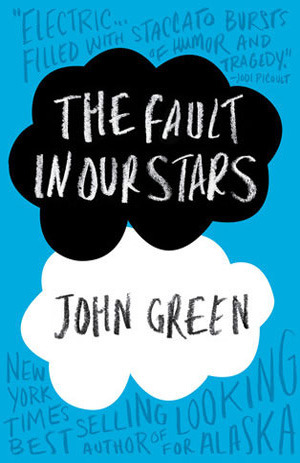Green, John. Dutton Books, 2012.
Pages [313 p.] [$21.99] ISBN [0525478817]
From Goodreads: "Diagnosed with Stage IV thyroid cancer at 13, Hazel was prepared to die until, at 14, a medical miracle shrunk the tumours in her lungs... for now.
Two years post-miracle, sixteen-year-old Hazel is post-everything else, too; post-high school, post-friends and post-normalcy. And even though she could live for a long time (whatever that means), Hazel lives tethered to an oxygen tank, the tumours tenuously kept at bay with a constant chemical assault.
Enter Augustus Waters. A match made at cancer kid support group, Augustus is gorgeous, in remission, and shockingly to her, interested in Hazel. Being with Augustus is both an unexpected destination and a long-needed journey, pushing Hazel to re-examine how sickness and health, life and death, will define her and the legacy that everyone leaves behind."
While this book has been one of the most acclaimed YA books in recent history, even going so far to be named the Top Fiction Book of 2012, beating out such titles as "The Casual Vacancy", "Where'd You Go, Bernadette", and so forth, I must admit that I do have a number of issues with it.
The first issue that I have with it is it's unofficial tagline, "Not another cancer book." Growing up I read more books about children/ teens with cancer than I can recount ("Breathless", "Six Months to Live", "As Long As We Both Shall Live", to name a few) and I must admit that I personally don't think that this book is all that different from those other titles. The characters all go through similar situations, experience the same thoughts, have the same outcomes, and so forth.
Another issue that I have is on a number of occasions John Green has stated that he likes to, "Write about/ for smart people." Even in my twenties (outside of the target audience) while reading this book I struggled, at times, to determine exactly what the characters (Hazel and Gus, especially) were saying during their monologues, of sorts, discussions of existentialism, and so forth. I think that as a teen (the targeted audience) I would have been even more so confused by the concepts/ language used in this book and that learning that Green writes for/ about "smart people" would have lead me to believe that I wasn't "smart" because I didn't understand it 100% (something that I think that no teenager should ever feel like/ question, with all of the other stressors, emotions, etc. going on in their life during that time). Furthermore, as such, I think that as a teen I never would have been able to relate to Hazel and Gus, something that was (and still is) extremely important to me as a reader.
Complaints aside, I did love the relationships in this book (between Hazel and Gus, between them and their parents, and so forth) and I did love when Hazel and Gus dropped the walls around them and just let themselves be teenagers. For instance, during this scene:
"He's not that smart," I said to Julie.
"She's right. It's just that most really good-looking people are stupid, so I exceed expectations."
"Right, it's primarily his hotness," I said.
"It can be sort of blinding," he said.
"It actually did blind our friend Isaac," I said.
"Terrible tragedy, that. But can I help my own deadly beauty?"
"You cannot."
"It is my burden, this beautiful face."
"Not to mention your body."
"Seriously, don't get me started on my hot bod. You don't want to see me naked, Dave. Seeing me naked actually took Hazel Grace's breath away," he said, nodding toward the oxygen tank.' (pg. 251).
"He's not that smart," I said to Julie.
"She's right. It's just that most really good-looking people are stupid, so I exceed expectations."
"Right, it's primarily his hotness," I said.
"It can be sort of blinding," he said.
"It actually did blind our friend Isaac," I said.
"Terrible tragedy, that. But can I help my own deadly beauty?"
"You cannot."
"It is my burden, this beautiful face."
"Not to mention your body."
"Seriously, don't get me started on my hot bod. You don't want to see me naked, Dave. Seeing me naked actually took Hazel Grace's breath away," he said, nodding toward the oxygen tank.' (pg. 251).
Personal feelings aside, from a librarian point of view, I would still recommend this book to YA patrons as I do think that it is quite different from what is currently on the YA market (paranormal, dystopian, etc.), it introduces them to situations they may be unfamiliar with (disease and death), and so forth.

No comments:
Post a Comment